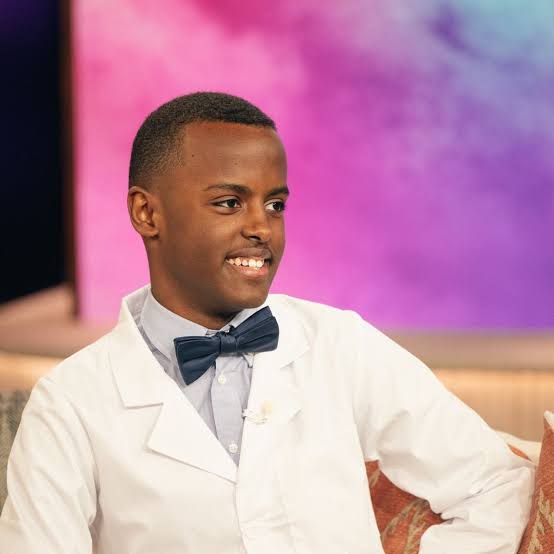Heman Bekele Brings Vision for Accessible Cancer Treatment to ISM Summer Research
Posted in News Story

This summer, Heman Bekele, named TIME’s 2024 Kid of the Year for his development of a low-cost, cancer-fighting soap, joined the Institute for Soft Matter Synthesis and Metrology (ISMSM) at Georgetown University to expand his scientific knowledge and deepen his understanding of drug delivery mechanisms.
Bekele is spending the summer in Professor Edward Van Keuren’s lab, working with nanoparticles that could one day enhance the therapeutic effectiveness of his soap. “The past two to three weeks have had a really heavy focus on synthesizing nanoparticles—specifically polymer nanoparticles with what’s called PLGA, which is just the type of polymer,” he explained. “What we’re doing is kind of a unique method of making nanoparticles called nanoprecipitation… You spin water or some aqueous phase as fast as you can and then inject your drug and polymer or lipid into that, and you create nanoparticles in the water.”
It hasn’t been smooth sailing but that’s part of what excites him. “It definitely didn’t work the first time,” Bekele said. “A solid half of the day is spent just preparing samples and trying to make something work. You can very clearly tell when it works and when it doesn’t.”
Outside of synthesis, his days have also included hands-on characterization work. “Sometimes I do characterization when the scanning electron microscope (SEM) is open, which is really cool,” he said. “Even when I was doing SEM… figuring out how to work the machine, getting it into focus, changing the stagnation and wobbling—there’ve been so many new things that I’ve learned in the small amount of time that I’ve been here.”
Collaboration, Mentorship, and a Research Community
Bekele emphasized that one of the most transformative parts of his summer experience has been the environment of collaboration. “Everyone has been so accepting of my ideas and being able to explore a lot of the really cool avenues that this project could go towards.”
He’s found inspiration not just in his own work, but in the diverse range of research happening around him. “There are so many really interesting projects actively being streamlined at once,” he said. “I’m working on this nanoparticle loading into mucomed, and then a couple of other peers are working on similar nanoparticle projects, but for completely different diseases.”
Weekly lab meetings gave Bekele the chance to see how more experienced researchers tackle roadblocks. “Everyone kind of has a problem or roadblock or some obstacle when they’re doing their research,” he said. “And I think I’ve learned a lot from seeing their problem-solving capabilities… how it’s almost just become natural and intrinsic to the research that they’re doing.”
Those lessons, both technical and personal, will stick with him. “Being part of something bigger than just my own project… taught me a lot about how that entire process should go—not necessarily just from that rigorous scientific perspective, but also from a humanitarian and empathetic perspective.”
Bekele hopes to continue his involvement in the lab into the school year. “I’ve made a lot of really great connections with people that I will definitely stay in touch with,” he said.
Science with Purpose
Bekele’s broader mission is to create accessible, affordable healthcare solutions. His work with nanoparticles this summer is a step toward that goal.
“In the scope of the bar of soap, it’s definitely directly related,” he said. “Hopefully the nanoparticles we’re able to synthesize this summer can then be the main active ingredient with the bar of soap—be like that immunotherapeutic.”
But for Bekele, the bigger picture goes beyond one product. “Everything that I’ve been working on this summer has been relatively cost-effective, low-cost, and really easy to produce,” he said. “I hope the biggest step with all of this research… is that it can be this really accessible and affordable form of drug delivery and skin cancer treatment.”
Looking Ahead
Bekele also offered thoughtful feedback for institutions like ISM that want to nurture young researchers. “It’s always great to have more opportunities to get hands-on experience,” he said. “A lot of the machinery is, of course, very complex, and so people kind of just assume that it’s meant to be handled by people with lots of experience… but there’s always an opportunity for young people to at least be able to learn.”
He hopes future students will have the same chance to grow and explore. “The first time I was using the SEM, I was very intimidated. It’s a big machine—lots of buttons,” he said. “But over time, I was able to kind of develop that skill set.”
When asked what he’s most proud of, Bekele didn’t hesitate: “With all of my research, I’ve kept affordability as kind of a constant. There were many opportunities along the way where something a little more expensive would have made things faster—but I’ve just kept that idea in mind. I’m proud that even as long as it takes, the research that I’m doing is still focused on accessibility.”
